In New York City (NYC), mold is a prevalent issue in residential and commercial properties, prompting the enactment of laws and regulations to address its management and remediation. Understanding these laws is crucial for property owners, tenants, and landlords to ensure compliance and uphold safe living and working environments.
Local Law 55 of 2018
One of the primary regulations governing mold in NYC is Local Law 55 of 2018, also known as the “Mold Law.” This law mandates specific requirements for landlords and property managers regarding mold assessment, remediation, and tenant notification. Key provisions of Local Law 55 include:
- Inspection and Assessment: Landlords are required to conduct mold inspections in response to tenant complaints of mold-related conditions. Licensed mold assessors must perform these assessments to determine the extent of mold growth and identify underlying moisture issues.
- Notification: Upon confirming the presence of mold exceeding permissible limits, landlords must provide tenants with written notification detailing the inspection results, remediation plans, and any health hazards posed by the mold.
- Remediation: Landlords are responsible for promptly remediating mold conditions in accordance with industry standards and guidelines established by the NYC Department of Health (DOH). Remediation efforts must effectively remove mold and address underlying moisture sources to prevent recurrence.
- Tenant Rights: Tenants have the right to request mold inspections and receive timely remediation of mold conditions that exceed permissible limits. Landlords are prohibited from retaliating against tenants who assert their rights under Local Law 55.

NYC Department of Housing Preservation and Development (HPD) Guidelines
In addition to Local Law 55, the NYC Department of Housing Preservation and Development (HPD) provides guidelines and resources to assist property owners, tenants, and landlords in addressing mold issues effectively. HPD’s guidelines offer practical recommendations for mold assessment, remediation, and prevention, emphasizing the importance of maintaining safe and habitable living environments for residents.
Tenant Protection Laws
NYC’s tenant protection laws also afford tenants certain rights and protections concerning mold remediation. Tenants have the right to file complaints with HPD or take legal action against landlords who fail to address mold issues promptly or provide adequate remediation measures. These laws aim to safeguard tenants’ health and well-being and hold landlords accountable for maintaining safe housing conditions.
Conclusion
Mold laws in NYC, including Local Law 55 of 2018 and HPD guidelines, play a critical role in safeguarding public health and ensuring habitable living environments for residents. Property owners, tenants, and landlords must familiarize themselves with these laws and adhere to their requirements to mitigate mold-related risks effectively. By complying with mold regulations and promoting proactive mold management practices, stakeholders can contribute to healthier and safer communities across NYC.
